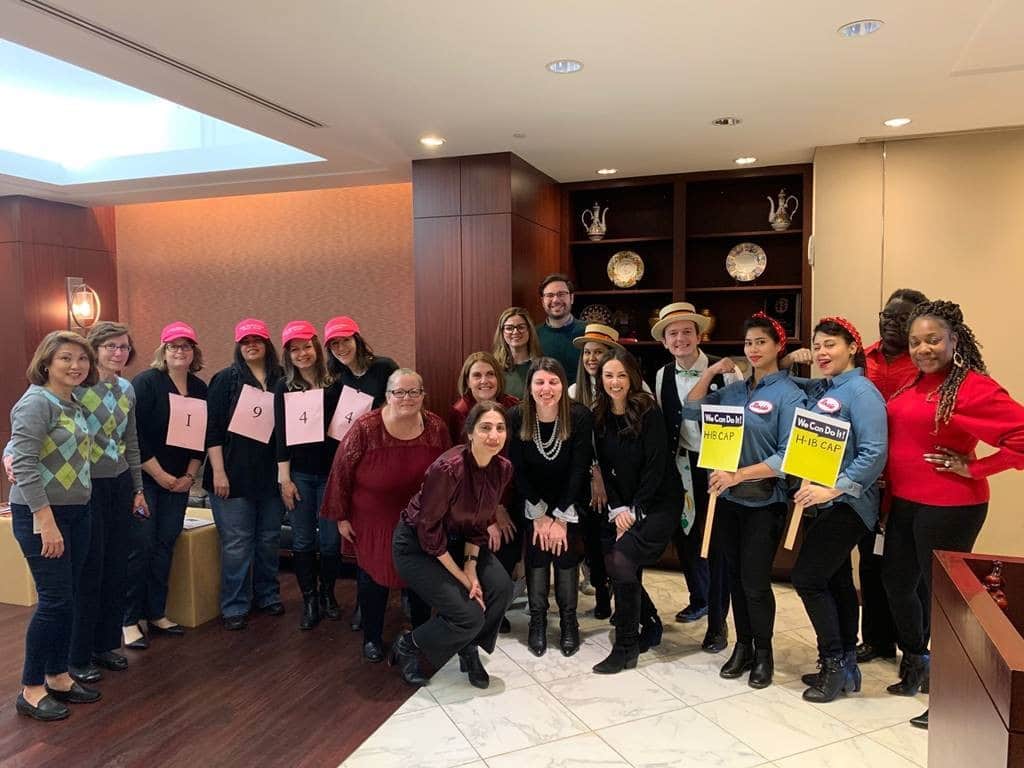1. Klasko Immigration Law Partners Firm Operations Update During COVID-19
On March 19, Klasko Immigration Law Partners issued this update on firm operations moving to fully remote in order to comply with local and national mandates. In the update, the following specific questions are answered:
- Will you continue working on my case(s) during the shutdown?
- Will you be checking your email?
- Can I call you if I have any questions?
- Can I still mail you documents or forms/checks?
- Can I send you documents through FedEx/DHL/UPS?
- Will you receive mail from USCIS/Department of Labor?
- When will my case be filed?
- What happens if USCIS is shut down and my status is expiring?
- What can I do to help?
To stay informed on the latest immigration and firm alerts during this rapidly changing situation, subscribe to firm updates here, and follow us on social to receive alerts Twitter, Facebook, and LinkedIn.
2. COVID-19 Update: Latest Developments
As many know by now, the novel coronavirus (SARS-CoV-2), which causes the disease COVID-19, is a pandemic threatening populations worldwide. The following are a few highlights of new immigration-related developments in the short term, as of press time:
- The REAL ID deadline has been extended 12 months, to October 1, 2021. The REAL ID Act establishes minimum security standards for license issuance and production and prohibits federal agencies from accepting driver’s licenses and identification cards from states not meeting the Act’s minimum standards for the purposes of accessing federal facilities, entering nuclear power plants, and boarding federally regulated commercial aircraft. See here.
- U.S. Citizenship and Immigration Services (USCIS) has extended its suspension of routine in-person services until at least April 7, 2020. USCIS staff will continue to perform duties that do not involve contact with the public. The agency said it will provide emergency services in limited situations. To schedule an emergency appointment, contact the USCIS Contact Center (https://www.uscis.gov/contactcenter). USCIS said:
“USCIS field offices will send notices to applicants and petitioners with scheduled appointments and naturalization ceremonies impacted by the extended closure. USCIS asylum offices will send interview cancellation notices and automatically reschedule asylum interviews. When the interview is rescheduled, asylum applicants will receive a new interview notice with the new time, date and location of the interview. When USCIS again resumes normal operations, USCIS will automatically reschedule ASC [Application Service Center] appointments due to the office closure. You will receive a new appointment letter in the mail. Individuals who had InfoPass or other appointments must reschedule through the USCIS Contact Center once field offices are open to the public again. Please check to see if your field office has been reopened before reaching out to the USCIS Contact Center.” See here.
- USCIS has announced flexibility for Requests for Evidence (RFE) and Notices of Intent to Deny (NOID). For applicants and petitioners who receive an RFE or NOID dated between March 1 and May 1, 2020, any responses submitted within 60 calendar days after the response deadline set forth in the RFE or NOID will be considered by USCIS before any action is taken. See here.
- The Department of Homeland Security and U.S. Immigration and Customs Enforcement announced flexibility in complying with I-9 requirements by employers and workplaces operating remotely. Specifically, DHS said it “will exercise discretion to defer the physical presence requirements.” Employers with employees taking physical proximity precautions due to COVID-19 will not be required to review the employee’s identity and employment authorization documents in the employee’s physical presence. Employers must inspect the Section 2 documents remotely (e.g., over video link, fax, or email) and obtain, inspect, and retain copies of the documents within three business days of hire for purposes of completing Section 2. Employers should enter “COVID-19” as the reason for the physical inspection delay in the Section 2 “Additional Information” field once physical inspection takes place after normal operations resume. Once the documents have been physically inspected, the employer should add “documents physically examined” with the date of inspection to the Section 2 additional information field on the Form I-9, or to Section 3 as appropriate. These provisions may be implemented by employers either for a period of 60 days from the date of this notice or within 3 business days after the termination of the National Emergency, whichever comes first. Employers who avail themselves of this option must provide written documentation of their remote onboarding and telework policy for each employee, DHS said. USCIS said employers should monitor the DHS and ICE websites for additional updates on when the extensions will be terminated and normal operations will resume. See here.
- Premium processing is temporarily suspended for all I-129 and I-140 petitions until further notice. USCIS will process any petition with a previously accepted Form I-907, Request for Premium Processing Service, in accordance with the premium processing service criteria. However, the agency said it will not be able to send notices using pre-paid envelopes and will only send batch-printed notices. Petitioners who have already filed Form I-129 (Petition for a Nonimmigrant Worker) or Form I-140 (Immigrant Petition for Alien Workers) using the premium processing service and who receive no agency action on their case within the 15-calendar-day period will receive a refund, USCIS said. The agency will notify the public with a confirmed date for resuming premium processing. USCIS will reject the I-907 and return the $1,440 filing fee for all petitions requesting premium processing that were mailed before March 20 but not yet accepted.
The suspension includes new premium processing requests for all H-1B petitions, including H-1B cap-subject petitions for fiscal year 2021, petitions from previous fiscal years, and all H-1B petitions that are exempt from the cap. See here.
- USCIS has temporarily closed its offices in Rome, Italy, and Nairobi, Kenya, to the public. In February, USCIS announced the temporary suspension of services in Beijing and Guangzhou, China. USCIS said it will reschedule appointments and will continue to respond to email inquiries, which should be submitted in English to the Rome Field Office (here) or the Nairobi Field Office (here). See here.
- The Department of Labor’s Office of Foreign Labor Certification (OFLC) has alerted employers and other stakeholders that through June 30, 2020, the Atlanta National Processing Center will issue PERM labor certification documents electronically to employers and their authorized attorneys or agents. Through June 30, 2020, employers or their authorized attorneys/agents who file the application and are granted a permanent labor certification by OFLC will receive the certified Form ETA-9089 and Final Determination letter by email. In circumstances where employers or, if applicable, their authorized attorneys or agents, are not able to receive the certified Form ETA-9089 documents by email, OFLC said it will send the original security paper Form ETA-9089 and Final Determination letter using UPS regular delivery (i.e., approximately 2 to 8 days depending on delivery location).
Upon email receipt of an electronic copy of the certified Form ETA-9089, the form must be printed, and then signed and dated by each of the following before filing the Form
I-140 with USCIS: the foreign worker, preparer (if applicable), and employer. USCIS said it “may consider this printed Form ETA-9089, containing all signatures, as satisfying the requirement that petitioners provide evidence of an original labor certification issued by DOL.” See here. (scroll to announcement for March 24, 2020).
- OFLC has released frequently asked questions regarding COVID-19 issues. OFLC said it remains fully operational (as of March 20, 2020) under the federal government’s maximum telework flexibilities operating status. This includes the National Processing Centers, PERM System, and Foreign Labor Application Gateway (FLAG) System. OFLC said it continues to process and issue prevailing wage determinations and labor certifications that meet all statutory and regulatory requirements. See here.
The situation is rapidly evolving, and changes to the information above are possible. Please contact your Klasko attorney for advice in specific situations.
3. COVID-19 Update: USCIS Suspends Most In-Person Services, U.S. North/South Borders Closed to Nonessential Traffic, Other Developments
As many know by now, the novel coronavirus (SARS-CoV-2), which causes the disease COVID-19, is now a pandemic threatening populations worldwide. With respect to its effects on employment-based immigration, foreign students, and cross-border travel, the following are a few highlights of developments in the short term, as of press time:
- U.S. Citizenship and Immigration Services (USCIS) has suspended routine in-person services until at least April 1, 2020, to help slow the spread of COVID-19. USCIS staff will continue to perform duties that do not involve contact with the public. The agency said it will provide emergency services in limited situations. To schedule an emergency appointment, contact the USCIS Contact Center (https://www.uscis.gov/contactcenter). USCIS field offices will send notices to applicants and petitioners with scheduled appointments and naturalization ceremonies affected by this closure.
- The stoppage includes visa interviews for H-2A Mexican temporary farmworkers at U.S. consular posts in Mexico who want to work in the United States. Some may be able to obtain interview waivers, but growers reportedly were told that H-2A visa applications for new workers would not be processed. This has raised concerns about potential effects on the U.S. produce supply.
- USCIS is accepting all benefit forms and documents with reproduced original signatures for submissions dated March 21, 2020, and beyond.
- The Department of Labor’s Office of Foreign Labor Certification (OFLC) said it continues to process and issue prevailing wage determinations and labor certifications. OFLC released frequently asked questions on March 20, 2020, including information about what is considered timely notice when a worker must be moved to a new worksite due to pandemic concerns.
- E-Verify has extended the timeframe for taking action to resolve Tentative Nonconfirmations (TNCs) due to Social Security Administration office closures. E-Verify is also extending the timeframe to take action to resolve Department of Homeland Security TNCs “in limited circumstances when an employee cannot resolve a TNC due to public or private office closures. Employers may not take any adverse action against an employee because the E-Verify case is in an interim case status, including while the employee’s case is in an extended interim case status.
- The Student and Exchange Visitor Program (SEVP) released guidance for stakeholders on March 13, 2020. The guidance notes that if a school must close temporarily with no online or other alternative learning procedures, the students “should remain in active status in SEVIS so long as the students intend to resume their course of study when classes resume.” If a school offers online instruction or another alternative upon closing temporarily, nonimmigrants should participate and remain in active status in SEVIS. Schools must notify SEVP of COVID-19-related procedural changes within 10 business days.
- President Trump and Canadian Prime Minister Justin Trudeau closed the U.S.-Canada border as of March 18, 2020, to “non-essential traffic,” such as recreation and tourism, for an indefinite period. President Trump tweeted that “[t]rade will not be affected,” and workers who live on one side and work on the other are expected to continue traveling across the border for work.
- Similarly, the United States and Mexico are limiting nonessential travel across the border, with exceptions.
- U.S. Immigration and Customs Enforcement (ICE) announced that it is temporarily “adjust[ing] its enforcement posture” as of March 18, 2020. ICE’s Enforcement and Removal Operations will focus on “public safety risks and individuals subject to mandatory detention based on criminal grounds.” For those who do not fall into these categories, the agency said it will “exercise discretion to delay enforcement actions until after the [pandemic] crisis or utilize alternatives to detention, as appropriate.” ICE said it will not carry out enforcement operations at or near health care facilities “except in the most extraordinary of circumstances.”
- According to reports, immigration attorneys have sent multiple letters to the Departments of Homeland Security, State, and Labor, raising concerns about agency office closures and potential disruptions to the immigration system. Some are calling for a suspension of immigration compliance deadlines. Attorneys are also calling for the suspension of in-person immigration hearings and the use of telephone bond hearings for detainees.
The situation is rapidly evolving, and changes to the information above are possible. Contact your Alliance of Business Immigration Lawyers attorney for advice in specific situations.
Details:
- USCIS COVID-19 announcement is here.
- USCIS announcement regarding office closures is here.
- USCIS announcement regarding required signatures is here.
- OFLC FAQ is here.
- SEVP guidance for stakeholders is here.
- E-Verify announcement is here.
- ICE announcement is here.
- President Trump’s U.S.-Canada border closing tweet is here.
- Related news articles:
- Washington Post, “Trump, Trudeau Agree to Close U.S.-Canada Border to ‘Nonessential’ Traffic”
- The Guardian, “Trump Announces U.S.-Canada Border Traffic Closed to ‘Nonessential’ Traffic“
- Washington Post, “Americans, Canadians Scramble to Get Home Before Border Largely Shuts Down“
- NBC News, “S. Restricts Visas for Farmworkers, Raising Concerns About Food Supply“
- CNN, “13 Changes to the U.S. Immigration System During the Coronavirus Pandemic“
- Law.com, “Lawyers Push for Change to Immigration Court Amid COVID-19 Concerns“
- Al Jazeera, “U.S. Border Closings,” video news report is here.
- Practical Law, “Expert Q&A: COVID-19 and Immigration“
- US.-Mexico border restriction notice is here.
4. Alliance of Business Immigration Lawyers Calls on Agencies to Suspend Immigration Deadlines Due to COVID-19 Pandemic
In response to the COVID-19 pandemic, the Alliance of Business Immigration Lawyers (ABIL) issued a press release on March 16, 2020, urging the Departments of Homeland Security, State, Justice, and Labor to immediately suspend all immigration compliance deadlines.
The release notes, among other things, that agency guidance on this front has not been “authoritative and reliable” and that responses from federal immigration authorities have been either nonexistent or issued in “uncoordinated, piecemeal fashion,” such as by announcing some immediate reductions in immigration and visa services and office closures.
ABIL calls on all federal immigration authorities to announce, effective immediately, that “all immigration deadlines are automatically postponed and all current periods of employment authorization and lawful immigration status are automatically extended until the COVID-19 outbreak is declared to be under control.”
Details:
- ABIL press release is here.
5. H-1B Initial Electronic Registration Selection Process Is Completed
U.S. Citizenship and Immigration Services (USCIS) announced on March 27, 2020, that it has received enough electronic registrations during the initial period to reach the fiscal year (FY) 2021 H-1B numerical allocation (H-1B cap). USCIS plans to notify petitioners with selected registrations by March 31, 2020, that they are eligible to file an H-1B cap-subject petition for the beneficiary.
USCIS said registrants’ online accounts will now show one of the following statuses for each registration (that is, for each beneficiary registered):
- Submitted: A registration status may continue to show “Submitted” after the initial selection process has been completed. “Submitted” registrations will remain in consideration for selection until the end of the fiscal year, at which point all registration statuses will be Selected, Not Selected, or Denied.
- Selected: Selected to file an FY 2021 H-1B cap-subject petition.
- Denied: A duplicate registration was submitted by the same registrant for the same beneficiary, or a payment method was declined and not reconciled. If denied as a duplicate registration, all registrations submitted for the beneficiary for the fiscal year are invalid.
Only petitioners with selected registrations may file H-1B cap-subject petitions for FY 2021, and only for the beneficiary in the applicable selected registration notice.
Details:
6. E-Verify Self-Check Has New TNC Features
E-Verify has announced that myE-Verify users now can begin using new features, guidance, and updated screens in Self Check to:
- Confirm their employment eligibility in a single case;
- Resolve a Tentative Nonconfirmation (TNC) (formerly known as a mismatch);
- Resolve a Dual TNC from the Department of Homeland Security (DHS) and the Social Security Administration (SSA); and
- Track their case to completion and view the results once resolved.
Users who receive a TNC and choose to resolve now have eight federal working days to take action. A system-generated Further Action Notice (FAN) and a Referral Date Confirmation letter will be issued to the user as proof their case has been referred to either DHS, SSA, or both.
U.S. Citizenship and Immigration Services (USCIS) said users should contact the appropriate agency in the notice for additional support and resolution. Those who do not take action within the eight federal working days will receive a Final Nonconfirmation (FNC). If the user resolves the TNC after an FNC is issued, they may create a new Self Check case. If the user made a data entry error, they can now close the TNC case and create a new case. Users may only have one Self Check case open at a time.
USCIS said that although myE-Verify remains voluntary and does not replace the E-Verify process, the new features allow applicants, job-seekers, and employees to address their potential TNC status before their next E-Verify employer does.
USCIS announced the following temporary policies in response to the pandemic:
- Employers are still required to create cases for their new hires within three business days from the date of hire.
- Employers must use the hire date from the employee’s Form I-9 when creating the E-Verify case. If case creation is delayed due to COVID-19 precautions, select “Other” from the drop-down list and enter “COVID-19” as the specific reason.
- Employers may not take any adverse action against an employee because the E-Verify case is in an interim case status, including while the employee’s case is in an extended interim case status.
Details:
- myE-Verify is here.
- Self Check is here.
- Case Tracker is here.
- Due to current circumstances related to COVID-19, E-Verify has updated some policies that temporarily affect myE-Verify Self Check updates. See here.
7. USCIS Announces Temporary Suspension of Premium Processing for FY 2021 Cap-Subject H-1B Petitions
On March 16, 2020, U.S. Citizenship and Immigration Services (USCIS) announced the temporary suspension of premium processing service for fiscal year (FY) 2021 cap-subject
H-1B petitions due to the pandemic, and provided the following information:
- Petitioners filing FY 2021 cap-subject H-1B petitions will not be able to request premium processing when USCIS begins accepting cap-subject petitions on April 1, 2020. Until premium processing resumes for FY 2021 cap-subject H-1B petitions, USCIS will reject any Form I-907 concurrently filed with a cap-subject H-1B Form I-129.
- Premium processing will resume in a two-phased approach during the FY 2021 cap season. The first phase will include FY 2021 cap-subject H-1B petitions, including those eligible for the advanced-degree exemption, requesting a change of status from F-1 nonimmigrant status. The second phase will include all other FY 2021 cap-subject petitions.
- USCIS said it will resume premium processing for FY 2021 cap-subject H-1B petitions requesting a change of status from F-1 nonimmigrant status by May 27, 2020, and will notify the public before premium processing resumes for these petitions. Petitioners must appropriately select response “b” for Item 4 in Part 2 of Form I-129, and indicate “F-1” for Item 5 and “Current Nonimmigrant Status” in Part 3 of Form I-129, to be eligible to file a Form I-907 as part of this first group.
- The earliest date that USCIS will resume premium processing for all other FY 2021 cap-subject H-1B petitions is June 29, 2020.
- Petitioners filing FY 2021 H-1B cap-subject petitions will be eligible to upgrade to premium processing by filing Form I-907 once premium processing resumes, as applicable. USCIS said it will notify the public with a confirmed date for resuming premium processing for FY 2021 H-1B cap-subject petitions.
- Premium processing remains available for H-1B petitions that are exempt from the cap, such as extension-of-stay requests.
Details:
- USCIS release is here.
8. Initial H-1B Electronic Registration Period Has Closed
The initial registration period for fiscal year 2021 H-1B numerical allocations has closed. If U.S. Citizenship and Immigration Services (USCIS) has received enough applications during this period, the agency will randomly select the number it projects are needed and notify users via their online accounts by March 31, 2020.
An H-1B cap-subject petition must be properly filed within the filing period indicated on the notice. The period for filing the H-1B cap-subject petition will be at least 90 days, USCIS said.
Details:
9. USCIS Issues Reminder on New Form I-9
U.S. Citizenship and Immigration Services (USCIS) has issued a reminder that a new Form I-9, Employment Eligibility Verification, has been released.
Employers may use the 07/17/2017 edition through April 30, 2020. Starting May 1, 2020, employers can use only the new form with a 10/21/2019 edition date located in the lower left corner of the form.
A revised Spanish edition with the same date (10/21/2019) is available for use in Puerto Rico only.
Details:
- English edition of the new Form I-9 is here.
- Spanish edition of the new Form I-9 is here.
- I-9 Central is here.
- Federal Register notice announcing the new form is here.
10. KLASKO NEWS
FIRM NEWS
Firm Operations
As the firm closely monitors the coronavirus (COVID-19) outbreak, we wanted to provide an update on operational changes and policies at the firm.
IN THE NEWS
William A. Stock
Bill weighed in on the Supreme Court decision in the Kansas vs. Garcia case on Forbes.com.
Firm
Klasko Immigration Law Partners is going green!. Read the firm’s sustainability initiative announcement that was published in SBWire and Digital Journal.
William A. Stock
Bill’s blog addressing the coronavirus considerations for H and L status employees was re-published by JD Supra.
William A. Stock
Bill was quoted in this Forbes article about how the coronavirus is raising immigration issues for businesses.
William A. Stock
Bill was mentioned on Dice Insights on how the coronavirus will impact H-1B workers.
Firm
Klasko has collaborated with EB5 Affiliate Network to update their EB-5 Project Risk Assessment Tool which helps investors identify fraudulent or poorly managed projects. Read more in this PRWeb press release.
RECENT SPEAKING ENGAGEMENTS
H. Ronald Klasko
On March 6th, Ron attended the 2020 AILA Spring CLE Conference & Webcast at Washington, D.C and spoke about litigation petition denials.
Michele G. Madera
Michele spoke at an AmerisourceBergen event at the Barclays Global Healthcare Conference about immigration law information on March 10, 2020.
Elise A. Fialkowski | Natalia Gouz
On March 11th, Elise and Natalia gave a webinar presentation hosted by University of Delaware about visa and permanent residence options for international students and exchange visitors.
H. Ronald Klasko
Ron gave a webinar to students of Wharton at the University of Pennsylvania on the topic Visa and Permanent Residence options for MBA Students on March 23,
ICYMI: RECENT BLOG POSTS AND ALERTS
How to Manage Hiring Needs during the Suspension of Premium Processing
In this new blog, Maria M. Mihaylova covers common questions and scenarios that clients have had regarding the suspension of premium processing, particularly during the current health crisis.
Resolving LCA Wage Issues During a COVID-19 Slowdown
The COVID-19 isn’t just a public health threat, it is also affecting every business across the U.S., as states declare stay-at-home directives. Associate Jordan J. Gonzalez covers how employers need to pay careful attention to their sponsored employees during this time.
FIRM NEWS: Update on Firm Operations During Coronavirus Outbreak
Ron Klasko gives you an update on firm operations and answers your pressing questions on how the firm will continue to deliver seamless client service as we implement work-from-home operations.
Client Alert: USCIS Office Closures in Response to the Coronavirus (COVID-19) Pandemic
In this Client Alert, associate Maria M. Mihaylova addresses questions after the USCIS announces temporary closure due to the coronavirus pandemic.
Client Alert: Coronavirus Disrupts Inbound U.S. Travel and Immigration-Related Government Functions
In this client alert, associate Jordan J. Gonzalez gives an up to date summary on travel restrictions and immigration-related changes.
Court Overturns USCIS’s Narrowing of Professional Visa Eligibility
Jordan J. Gonzalez discusses the district court’s decision to overturn the USCIS’s restrictive interpretation of professional visa eligibility in this article.
Coronavirus Considerations for H and L Status Employees
Bill Stock answers questions about how the work-from-home directives will affect H and L status employees that have specific worksite requirements in this blog post.
Client Alert: USCIS Implements New Public Charge Rule, Effective February 24, 2020
Here’s what you need to know as the USCIS implements a new public charge rule in this client alert.





Earlier this month, the Klasko firm was just getting into the spirit for H-1B Cap season! On March 4th, staffers came dressed like their co-workers for this twin day event! Unfortunately, the rest of the month’s planned events were canceled as the firm began working remotely to safely continue operations during the novel coronavirus pandemic.
Stay Connected! Subscribe to our blog and follow us on Twitter, Facebook, and LinkedIn.
This newsletter was prepared with the assistance of ABIL, the Alliance of Business Immigration Lawyers, of which Klasko Immigration Law Partners is an active member.
